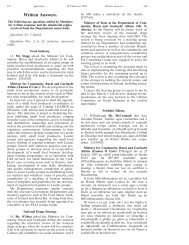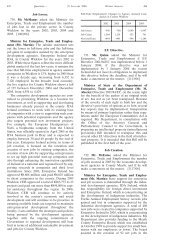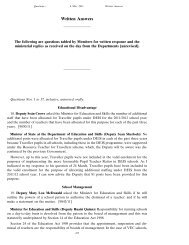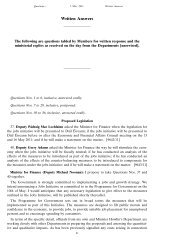Written Answers. - Parliamentary Debates - Houses of the Oireachtas
Written Answers. - Parliamentary Debates - Houses of the Oireachtas
Written Answers. - Parliamentary Debates - Houses of the Oireachtas
Create successful ePaper yourself
Turn your PDF publications into a flip-book with our unique Google optimized e-Paper software.
Questions— 14 February 2012. <strong>Written</strong> <strong>Answers</strong><br />
Missing Persons<br />
86. Deputy Mary Lou McDonald asked <strong>the</strong> Minister for Children and Youth Affairs if it is<br />
her intention to have <strong>the</strong> national missing children’s hotline, when established, run by a State<br />
agency or outsourced to a private company; and if she will make a statement on <strong>the</strong> matter.<br />
[8064/12]<br />
Minister for Children and Youth Affairs (Deputy Frances Fitzgerald): Under EU telecoms<br />
rules agreed in 2009, <strong>the</strong> 116000 number is reserved in all EU member states for a missing<br />
children hotline. My Department established and led a cross-sectoral Project Team, including<br />
representatives <strong>of</strong> my own Department, <strong>the</strong> Department <strong>of</strong> Justice and Equality, ComReg and<br />
An Garda Síochána to advance this matter.<br />
The position is that Comreg, who have responsibility for allocation <strong>of</strong> this number in Ireland,<br />
received an application to operate <strong>the</strong> Hotline from <strong>the</strong> ISPCC. Following cross departmental<br />
consultation and an examination <strong>of</strong> <strong>the</strong> issues involved by <strong>the</strong> Project team, Comreg has now<br />
allocated <strong>the</strong> number to <strong>the</strong> ISPCC.<br />
In <strong>the</strong> coming months <strong>the</strong> Project Team will now work to ensure that <strong>the</strong> Hotline becomes<br />
operational as soon as possible and operates in a way that supports and augments existing<br />
arrangements to secure child protection.<br />
Child Care Services<br />
87. Deputy Ca<strong>the</strong>rine Murphy asked <strong>the</strong> Minister for Children and Youth Affairs <strong>the</strong> way<br />
she interacts with o<strong>the</strong>r Government Departments in order to ensure <strong>the</strong> evaluation <strong>of</strong> legislation<br />
which affects children from a child-focused perspective; if she will outline her role in <strong>the</strong><br />
development and implementation <strong>of</strong> <strong>the</strong> child poverty strategy across <strong>the</strong> relevant organs <strong>of</strong><br />
<strong>the</strong> State; and if she will make a statement on <strong>the</strong> matter. [8008/12]<br />
Minister for Children and Youth Affairs (Deputy Frances Fitzgerald): My Department is<br />
charged with leading <strong>the</strong> development <strong>of</strong> harmonised policy and quality integrated service<br />
delivery to secure better outcomes for children and young people. The Department, as part <strong>of</strong><br />
<strong>the</strong> deliberative process <strong>of</strong> Government, routinely contributes observations on proposals for<br />
legislation and any possible impacts on children and young people that are identified through<br />
<strong>the</strong> impact assessment and poverty pro<strong>of</strong>ing processes, undertaken in line with Cabinet<br />
Handbook.<br />
The many dimensions to <strong>the</strong> well-being <strong>of</strong> children and young people require my Department<br />
to work across Government and with a wide range <strong>of</strong> stakeholders to promote <strong>the</strong> physical,<br />
emotional and economic well being <strong>of</strong> children and young people. Building strong collaborative<br />
relationships with Government departments to achieve <strong>the</strong>se aims is a key objective in <strong>the</strong><br />
Department’s Strategy Statement 2011-2014.<br />
Tackling child poverty is a priority for Government and a goal <strong>of</strong> <strong>the</strong> National Action Plan<br />
for Social Inclusion 2007- 2016, coordinated by <strong>the</strong> Department <strong>of</strong> Social Protection. Children<br />
are more likely to be poor if <strong>the</strong>y are living in lone parent households with low labour market<br />
participation and dependant on income support. The departments <strong>of</strong> Social Protection, Jobs,<br />
Enterprise and Innovation and Education and Skills, are working to deliver a range <strong>of</strong> measures<br />
aimed at getting people back to work.<br />
My Department works closely with <strong>the</strong> Department <strong>of</strong> Social Protection in a “whole <strong>of</strong><br />
Government approach” to tackling poverty in <strong>the</strong> population. The Department is represented<br />
on <strong>the</strong> Advisory Group on Tax and Social Welfare established by <strong>the</strong> Minister for Social<br />
Protection to examine issues to do with <strong>the</strong> interactions <strong>of</strong> <strong>the</strong> tax and welfare systems so that<br />
332











![[Deputy Michael Noonan.]](https://img.yumpu.com/30494839/1/190x245/deputy-michael-noonan.jpg?quality=85)




